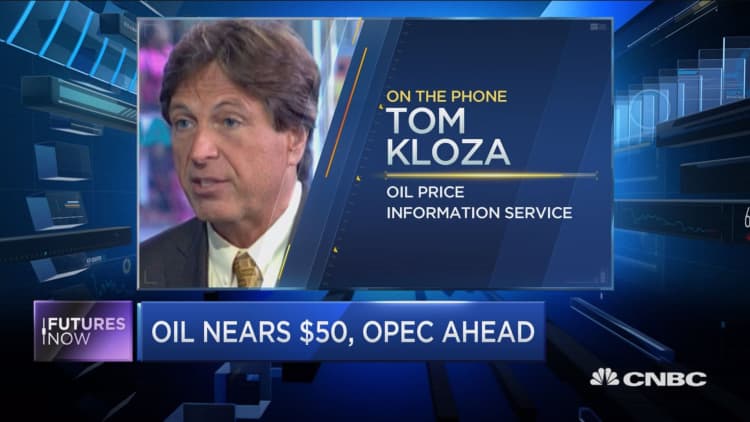
After oil touched $50 per barrel for the first time since November, investors remain focused on the potential outcome of this week's OPEC meeting in Vienna. However, one of Wall Street's most closely followed analysts has a clear message: The event is meaningless.
"I see nothing of consequence that will be discussed at this meeting," Tom Kloza said Tuesday on CNBC's "Futures Now."
The global head of energy analysis at the Oil Price Information Service is adamant that no progress was made between Saudi Arabia and Iran during OPEC's last gathering in Doha, Qatar. Therefore, he believes that the table is not set for any sort of announcement regarding a freeze or cut in June.
Read MoreStocks set for big, but short, rally of 5 to 10 percent: Analyst
"One can argue that OPEC is no longer a cartel, at least in the classic sense of a cartel having influence over supply and prices," noted Kloza in a note. So, with OPEC irrelevant in Kloza's eyes, he has turned his attention to the Federal Reserve as a key factor regarding the price of oil.
"There's no question that higher interest rates and less easy money are going to complicate the oil business," he said on "Futures Now."
The analyst believes that those who closely follow movement of the dollar have the greatest impact on where crude prices head. "If you look at oil trading each day, everything is front-end loaded each month," said Kloza, who believes that traders, not refiners, have the most power over where oil prices go next and therefore sees things becoming choppy in the months to come.
However, Kloza feels that the exception for a producer with a major impact lies with Saudi Arabia. This is because Kloza believes the kingdom could adopt a more aggressive approach when it comes to production this year.
"We're looking at a much more entrepreneurial Saudi Arabia that wants to engage in offshore drilling joint ventures," he said. "The key will be to watch what the Saudis do in the next few months."
To offset Saudi output, Kloza sees cheap prices as helping to keep global demand up. "We're becoming more balanced" when it comes to the world's oil supply, he said. "The problem will come when we get to August and we know we have enough gasoline to get through the season."
With enough gas in hand, Kloza said a surplus could drag oil prices down as most of the additional demand in the U.S. this year for gasoline is front-end loaded for July.
"I suspect prices will remain between $2.25 to $2.50 per gallon in the U.S. for the next two months, but watch for downswings in August and September," said Kloza. Regarding oil, he believes the commodity will trade on either side of $50 per barrel for most of June.



